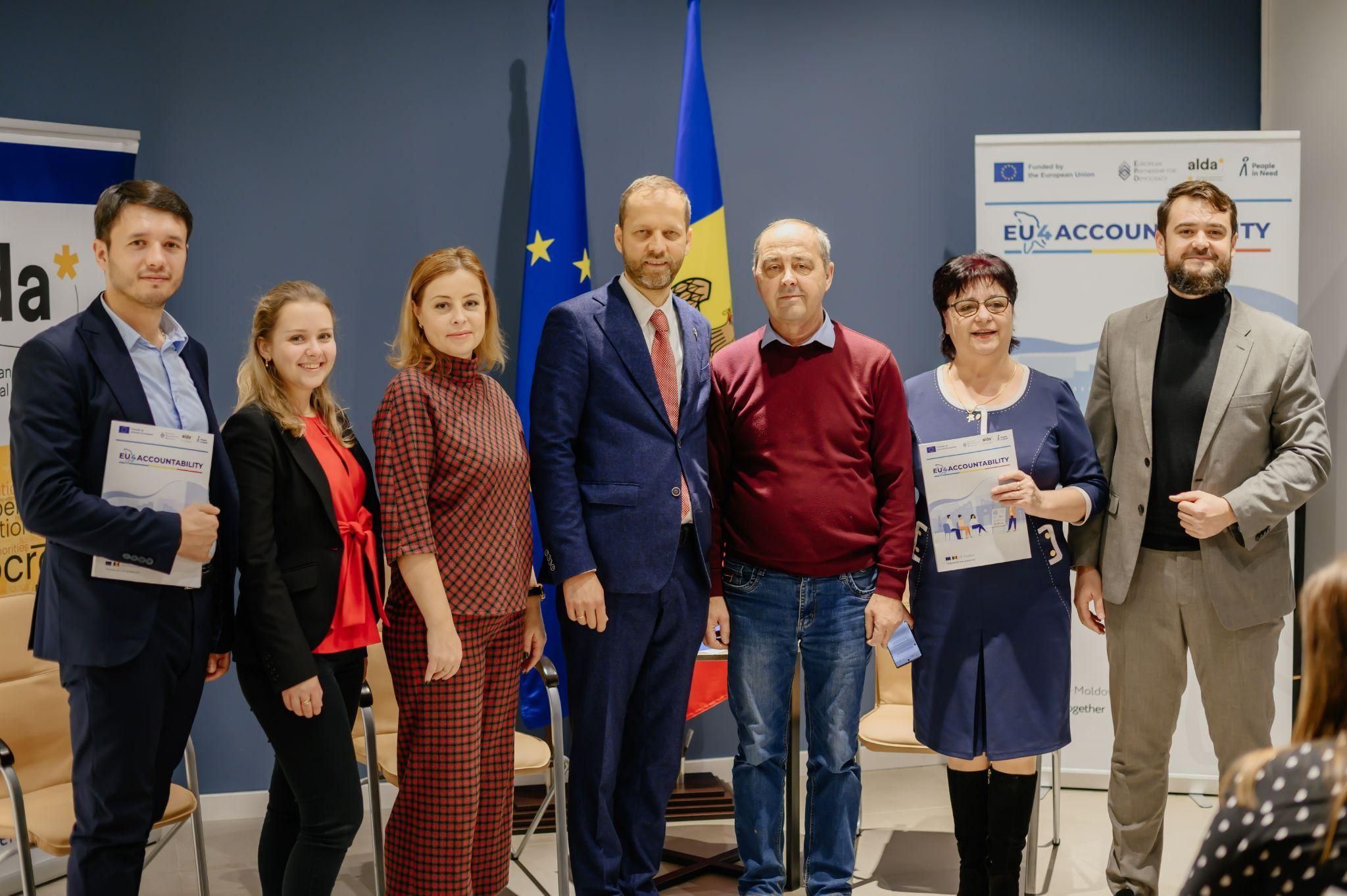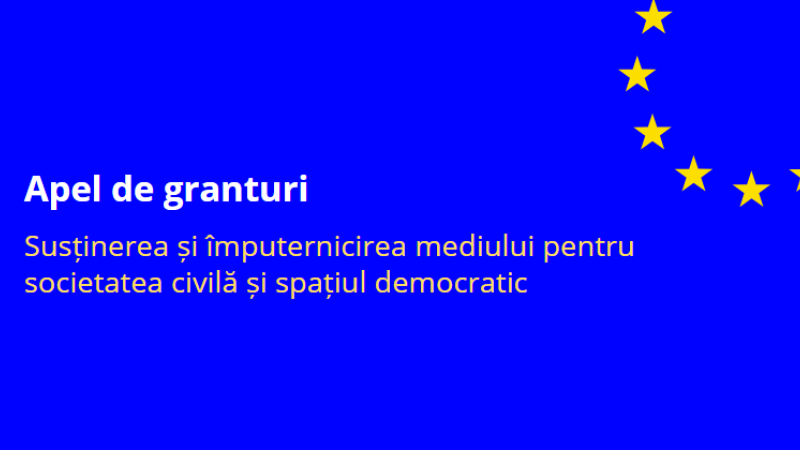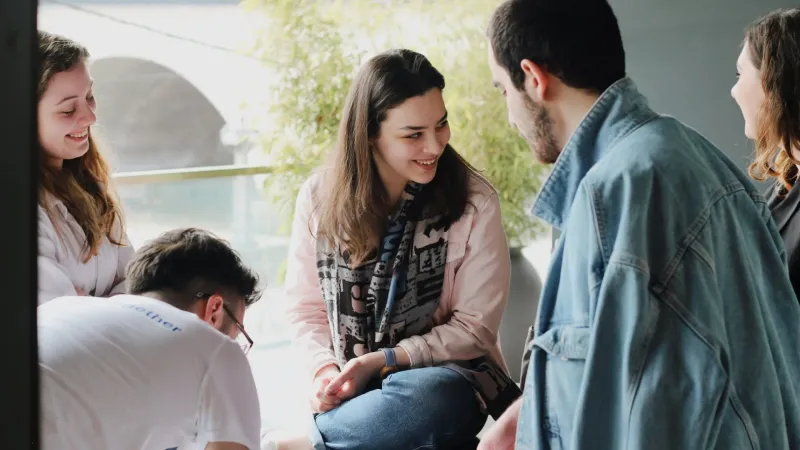
UE a acordat granturi pentru 50 de organizații ale societății civile pentru îmbunătățirea mecanismelor de responsabilitate socială în 10 raioane din Republica Moldova
50 de organizații ale societății civile din Cahul, Comrat, Cimișlia, Fălești, Florești, Glodeni, Râșcani, Strășeni, Ștefan Vodă, Telenești au primit granturi pentru proiecte la scară mică în valoare de 775.000 de euro. Acest program de granturi este gestionat de Asociația Europeană pentru Democrație Locală (ALDA) și ONG-ul ceh People in Need (PIN) în cadrul proiectului EU4Accountability. În următoarele luni, OSC-urile implicate în proiect vor fi susținute pentru a monitoriza politicile publice, a pune în aplicare mecanisme de responsabilitate socială, a organiza audieri publice, schimburile de experiență și preluarea bunelor practici.
În cadrul ceremoniei de acordare a granturilor, organizată la Europe Café, Jānis Mažeiks, Ambasadorul Uniunii Europene în Republica Moldova, a declarat: „Sprijinul financiar oferit astăzi de Uniunea Europeană va permite OSC-urilor să își consolideze eforturile pentru extinderea participării democratice și va contribui la îndeplinirea necesităților specifice cetățenilor (…). Campaniile publice pentru creșterea gradului de conștientizare a procesului bugetar, angajamentul civic pentru monitorizarea cheltuielilor publice și elaborarea politicilor și consultărilor bugetare participative – toate aceste acțiuni, având scopul de a determina cetățenii și autoritățile locale să aleagă împreună investițiile cele mai necesare, în comunitățile lor. Aș dori să felicit organizațiile societății civile, cărora li se acordă granturi în cadrul proiectului EU4Accountability și să le mulțumesc pentru dedicare și promovarea responsabilității sociale în Republica Moldova. Odată cu noul rol de țară candidată pentru aderare la UE, importanța societății civile este și mai evidentă.”
Responsabilitatea socială se referă la capacitatea cetățenilor de a-și exercita drepturile și de a monitoriza autoritățile publice, astfel încât acestea să implementeze politici publice care să includă contribuțiile societății civile. Responsabilitatea socială duce la dezvoltare și la o guvernare mai receptivă și eficientă. Aceasta ajută în special la consolidarea comunităților și la ascultarea nevoilor celor mai vulnerabile persoane din societate. Instrumentele de responsabilitate socială sunt în beneficiul tuturor cetățenilor și contribuie la crearea unui sistem de guvernanță eficient și democratic, care nu lasă pe nimeni în urmă.
Organizațiile societății civile din raioanele Cahul, Comrat, Fălești, Glodeni și Râșcani, selectate pentru a face parte din proiect, au decis deja ce fel de idei și practici privind responsabilitatea socială să aplice în comunitățile lor. Alături de ei va fi echipa People in Need Moldova, care va ghida procesele și va încuraja dialogul dintre ONG-uri și autoritățile publice locale (APL) din cele 5 raioane. Spre exemplu, în raionul Glodeni, Asociația Obștească (AO) „Solidarii neamului” va consolida capacitățile ONG-urilor locale, pentru ca ele să dispună de cunoștințe și tehnici de monitorizare a activității APL. AO „Baștina” din raionul Râșcani va dezvolta spiritul civic în rândul cetățenilor, astfel încât societatea civilă locală să fie mai implicată în luarea deciziilor și să pună presiune pe autorități, ca acestea să ia în calcul vocea locuitorilor și prioritățile înaintate de ei.
Unele asociații obștești planifică să organizeze vizite de studiu în țară, pentru a vedea și a discuta cu reprezentanții APL din alte raioane, care practică bugetarea participativă, iar AO „Moștenitorii” își propune să efectueze o vizită în România, pentru a cunoaște din experiența colegilor din Uniunea Europeană privind responsabilitatea socială. Alte ONG-uri vor face simularea alegerilor, dar într-o manieră diferită – un grup de inițiativă va identifica o problemă în sat, va pregăti bugetul și argumentarea de ce această problemă trebuie rezolvată, va prezenta locuitorilor din sat soluția propusă, iar la final cetățenii vor vota. Acest proces le va demonstra locuitorilor cum funcționează democrația și ce înseamnă eficiența guvernării, motivându-i să fie activi la nivel de comunitate. Totodată, unele dintre organizațiile societății civile selectate în cadrul proiectului EU4Accountability, vor primi cofinanțare pentru a se implica în proiecte de bugetare participativă. Această diversitate de idei și practici, ce vor fi aplicate în raioanele-țintă ale proiectului, arată deschiderea societății civile pentru procesele referitoare la responsabilitatea socială și trasează schimbările și îmbunătățirile ce vor veni la nivelul comunităților, cu sprijinul Uniunii Europene.


